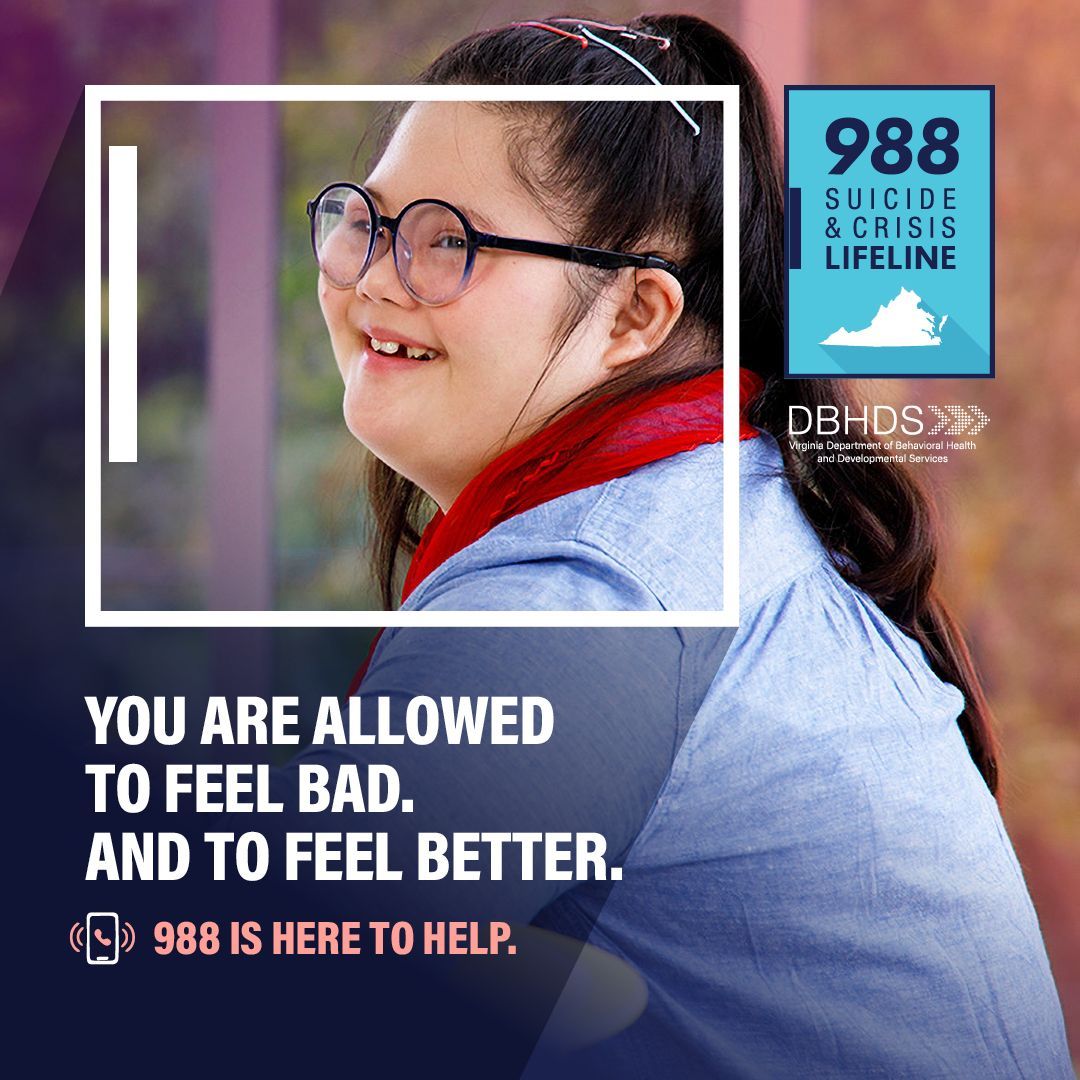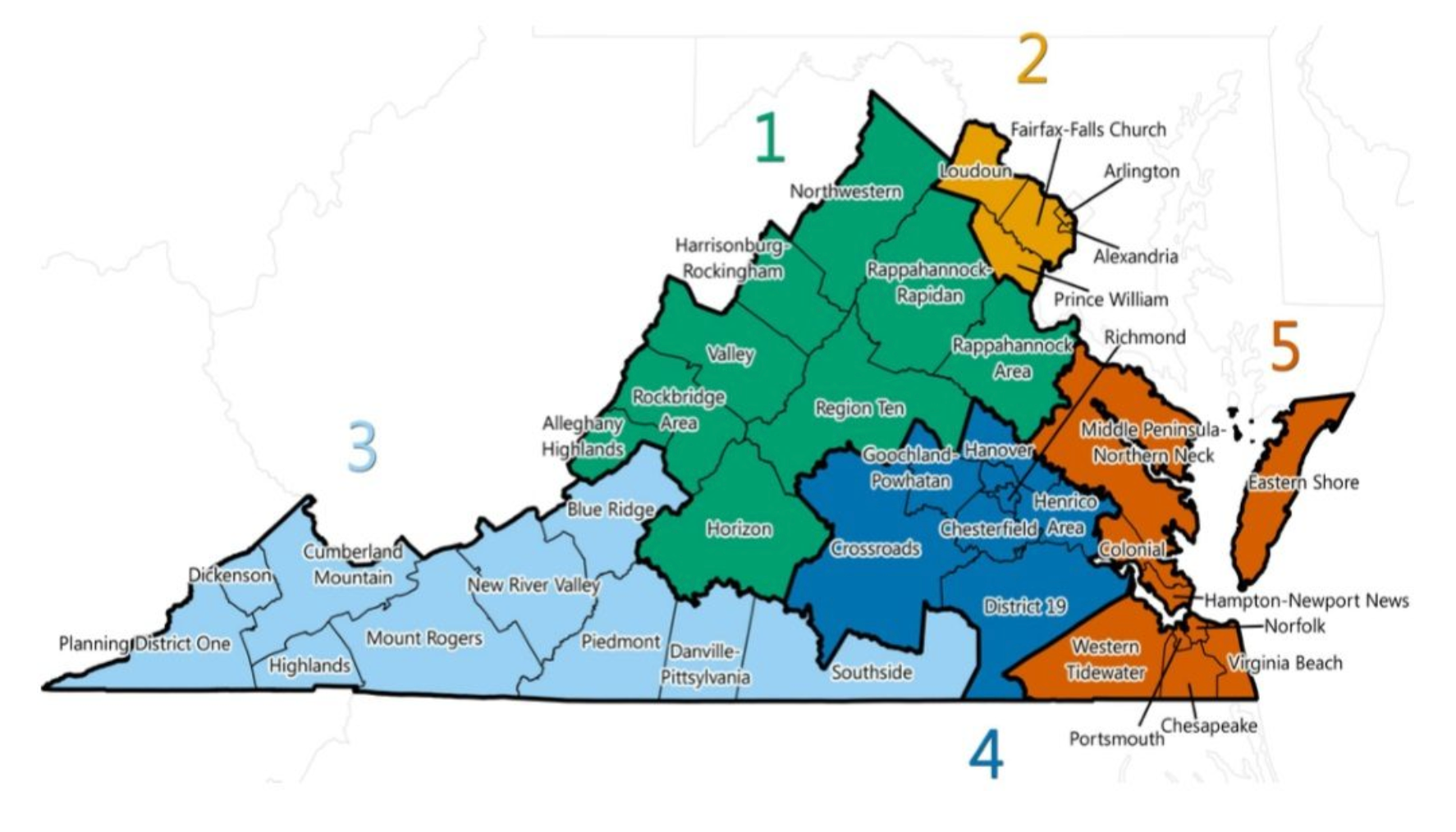Crisis Support
No one likes to think about being in a crisis, which makes it hard to plan for. However, learning about available resources while life is calm can help us feel more secure—and recover more quickly—when things get challenging.
Virginia offers several supports for individuals with developmental disabilities and their families during times of crisis. These include crisis prevention services, the 988 Suicide & Crisis Lifeline, and REACH (Regional Education Assessment Crisis Services and Habilitation). Knowing what’s available before a crisis happens can make all the difference.

Crisis Prevention
The Substance Abuse and Mental Health Services Administration (SAMHSA) provides guidance for people and families to help those struggling with mental health avoid a crisis situation.
For People:
- Build you support system by identifying people you trust to talk with about your mental health, listens to you and affirms your feelings, and helps you make a plan to take of yourself.
- Find a peer group of people with similar lived experience as you. They will understand what you are going through, remind you that you are not alone, and can be advocates for each other.
- Be an active member of your treatment by staying educated, informed, and engaged about your own mental health.
- Make a mental health plan that captures your goals, how you are going to achieve those goals, who your support and peers are, and tracks your mental health ups and downs.
For Family and Friends
- Ask the person questions about how they are and what they feel they need
- Express your concerns without criticizing or blaming a person for any behaviors they may not be in control of.
- Let the person know that help is available, both from you and professionals, and that asking for help is nothing to be ashamed of.
- Educate yourself and others about mental health conditions and resources.
If you or someone you know is in crisis
the 988 Lifeline is here
988 is a crisis hotline for anyone struggling with suicidal thoughts
or other crises. Please do not hesitate or feel ashamed to use this resource! 988 is free and has multiple ways to communicate, including calling, texting, chatting (virtually), and they offer Deaf/Hard of Hearing and Spanish services.
What to expect when you use 988:
- 988 will offer you a list of services. Pick the one(s) that best meet your needs.
- Wait on the line for a certified counselor to join your call or chat and introduce themselves
- Your counselor will make sure you are safe.
- Start communicating about your crisis and what you think you need.

REACH Services
DBHDS offers
Regional Education Assessment Crisis Services Habilitation
(REACH) services specifically to Virginians with developmental disabilities. You can access REACH by contacting your regional office for yourself or someone you know. Your regional office will assess you for service eligibility. If you are eligible, you will get services immediately.
- Mobile Crisis Response: Available 24/7, this crisis assessment and intervention service will come to you to help with crisis situations of a behavioral and/or mental nature.
- Community-Based Crisis Stabilization Services: Available 24/7, this service works with people in their community to provide brief therapeutic and skill building interventions, engagement of natural supports, interventions to integrate natural supports in the de-escalation and stabilization of the crisis, and coordination of follow-up services.
- Crisis Therapeutic Homes: The Crisis Therapeutic Home (CTH) is a residential crisis stabilization. The CTH is not meant for long-term residence or respite. It provides stabilization for individuals in crisis, planned prevention, or as a step-down from state hospitals, training centers, or jails. Priority is given to crisis admissions over planned prevention or step-down admissions.
- Crisis Education and Prevention Plan (CEPP): A plan which provides a concise, clear, and realistic set of supportive interventions to prevent or de-escalate a crisis and assist an individual who may be experiencing a behavioral loss of control. Customized training is provided for both the individual and their support network. The training focuses on specific plans and strategies to help the person handle early signs of distress, preventing crises from happening. By doing this, the chances of needing to move the person out of their home for care are greatly reduced.
- Training and Education: REACH provides training and education to the larger community (e.g. CSBs, families, providers, law enforcement, hospitals) both on REACH services and on topics which are pertinent to the population which REACH serves.

Connecting with REACH
REACH services are available by region. You can find what region you are using the map on the left. Region 1 is in green, 2 is yellow, 3 is light blue, 4 is dark blue, and 5 is orange.
For example, if you live in Hanover county, you are in the dark blue Region 4 area.
Check out your region's REACH contact information below!
REGION 1
Phone: 888-908-0486
Fax: 434-202-5249
Email: reach.managers@regionten.org
REGION 2
Phone: 855-897-8278
Fax: 571-477-2275
Email: adrienne.randall@eastersealsucp.com
REGION 3
Phone: 855-887-8278
Fax: 540-267-3403
Email: info@swvareach.org
REGION 4
Phone: 833-968-1800
Fax: 804-562-5135
Email: Tammy.BecoatEclou@rbha.org
REACH FAQ
Region 5
Phone: 888-255-2989
Email: reachmanagers@wtcsb.org
